
английский язык для общих целей
.pdf
Министерство образования и науки Российской Федерации Южно-Уральский государственный университет Кафедра иностранных языков
Ш143.21-9 А647
Ярославова Е.Н., Белкина О.В., Колова С.М., Гейхман Л.К., Кайдалова Ю.В., Радостева В.С.
АНГЛИЙСКИЙ ЯЗЫК ДЛЯ ОБЩИХ ЦЕЛЕЙ
Учебное пособие для студентов всех специальностей
Челябинск Издательский центр ЮУрГУ
2012
ББК Ш143.21-923 А647
Одобрено учебно-методической комиссией факультета «Лингвистика»
Рецензенты:
к.п.н. Н.С. Шкитина, к.п.н. В.Б. Мещеряков
Английский язык для общих целей: учебное пособие для студентов А647 всех специальностей / Е.Н. Ярославова, О.В. Белкина, С.М. Колова и др.
– Челябинск: Издательский центр ЮУрГУ, 2012. – 150 с.
Пособие предназначено для студентов начального этапа вузовской ступени иноязычной подготовки, его основная цель – систематизация и коррекция знаний, умений, навыков, сформированных на предыдущей ступениобучения.
Модульная организация пособия позволяет поэтапно формировать основные навыки речевой деятельности. Тематически пособие охватывает основные ценностные доминанты современного мира: «Семья и окружение», «Роль иностранного языка в жизни современного человека», «Человек и культура», «Глобальные проблемы человечества».
Структура каждого модуля построена по следующей схеме: цель модуля, тексты для чтения с заданиями, активный словарь, комплекс лексико-грамматических упражнений, задания для развития навыков устной и письменной речи. Для управления самостоятельной работой пособие снабжено инструкциями, грамматика представлена в виде комментария.
ББК Ш143.21-923
© Издательский центр ЮУрГУ, 2012
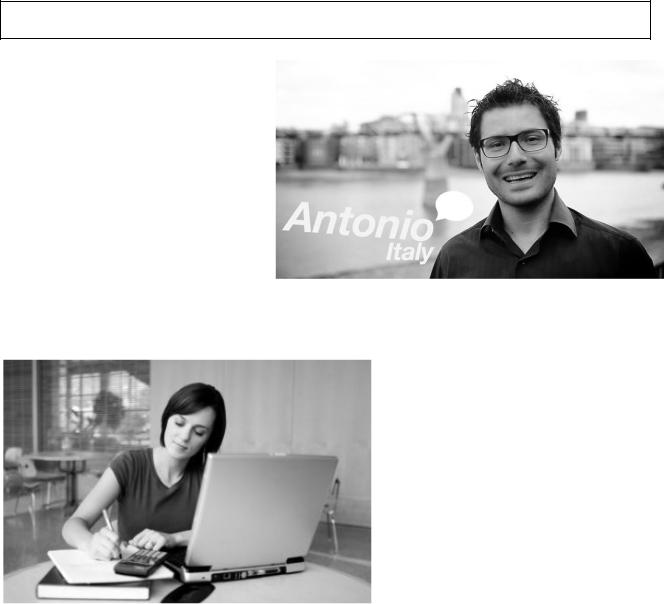
Module 1. Changing World
Unit 1. Getting to Know You
Lead-in
Where were you born?
What do you do?
Where do you come from?
How many languages do you know?
Listening and reading (from New Headway English Course by John and Liz Soars, OUP) 1. Listen to a student. Complete the text, using the verbs in the box
a)‘m enjoying b)‘m studying c) 'm going to work d) come e) live f)can speak g) started h) went
My name’s Antonio Celi. I (1)
_______ from Bologna, a city in the north of Italy. I’m a student at the University of Bologna. I (2) _______ modern languages - English and Russian. I also know a little Spanish, so I (3)
______ four languages. I (4) ______ the course a lot, but it’s really hard work. The course (5) _______ three years ago.
I (6) _______ at home with my parents and my sister. My brother (7)
_______ to work in the United States last year.
After I graduate, I (8) _______ as a translator. I hope so, anyway.
2. Listen to Carly. Complete the questions about Carly.
Hi. My name is Carly and I come from Australia. But I live near London now with my family and my husband Dave and our three children. I came to Britain fifteen years ago when I got married.
I’m a student with the open University. This means I watch special programmes on the television and work at home. I send my work to my course teacher every week. I’m studying art and the course is really interesting. At the moment I’m reading about Intalian painters in Italian, which is difficult be-
cause I only speak little Italian! My course started a year ago and it’s three years long. After I graduate , I’m going to look for a job in an art gallery or museum.
3

Where does she come from?
1)_____________ live?
2)_____________ live with?
3)What ______________ studying?
4)______________ enjoying the course?
5)How many _____________ speak?
6)______ did her course start?
7)What _______________ after she graduates?
3. Complete the questions to Carly.
1) “Which university do you go to?”
“I don’t go to university. I study at home.”
2)“______________ a job?” “Yes, I do. A part-time job.”
3)“What ________________ at the moment?” “I’m writing an essay.”
4)“______________ to England?”
“Fifteen years ago.”
5)“_____________ name?” “Dave.”
6)“_______________?” “He’s an architect.”
3. Read about Teddy. Complete the questions about Teddy.
Hi, my name is Theodore. Well that's my full name my friends call me Theo or Teddy. I am turning 17 on October 2nd of this year. My hobbies are downhill mountain biking and collecting car models and hotwheels. I love cars there my number 1 hobby. I am the youngest in my family out of 5 kids including me. I have 2 sisters, 2 brothers, their names are (oldest to youngest) Jamie (21) Justin (20) Tristan(18) Tanner (17)
And then there's me Theo turning 17. I have 2 parents of course but they are divorced but even though they are divorced they are very good friends.
How old is Teddy? What is he fond of?
How large is his family?
Who is the oldest/the youngest in the family? Did his parents split/divorce/live together?
4

4. Read about Tatjana and ask questions about her.
Hello! My name is Tatjana and I'm a Business & Management, Economics and German student (all Level 2 subjects). I'm from Riga, Latvia. I enjoy both academic and social parts of Glasgow life! In my first year I used to be a very active member of GU International Society, but this year I and my friends established GU Russian Speaking society where I'm a president. I love organizing events, meeting new people and socialising. Last year I lived in Murano Street Student Village
in a small flat for 5 people. This year I'm renting a flat with another Latvian girl.
I'm very sporty and I enjoy going to the gym. Also I have been playing tennis for more than 11 years.
I'm not really a crazy clubber, but of course I enjoy going out to the city centre from time to time.
Vocabulary
1. What is the appropriate English term for the following. Choose the one from the list below.
a)nephew, b) niece, c) stepbrother, d) brother in law, e) siblings, f) great grandmother
1)your sister’s daughter?
_ _ _ _ _
2)your sister’s son?
_ _ _ _ _ _
3)your grandmother’s mother?
_ _ _ _ _ _ _ _ _ _ _ _ _ _ _ _
4)your brothers and sisters?
_ _ _ _ _ _ _ _
5)your wife’s brother?
_ _ _ _ _ _ _ _ _ _ _ _
6) the son of your mother’s new husband?
_ _ _ _ _ _ _ _ _ _
Improve your study skills
Learning is ceaseless (бесконечно). Creating habits to help you learn and use the most accurate words in your language will make it easier to communicate, write, and think.
Part 1 of 3: Learning New Words
1. Read, read and read. Once you leave school, you won't get word drills and homework assignments that force you to learn new words. If you want to build your vocabulary, establish a reading regimen and stick to it.
•You might try reading one new book a week, or reading the newspaper every morning. Pick a frequency and pace that works for you, and develop a reading routine that fits into your schedule.
•Try to read at least one book and several magazines every week. Be consistent. As well as improving your vocabulary, you'll also keep updated and backdated, your general knowledge will increase, and you'll be an intelligent, well-rounded person.
5
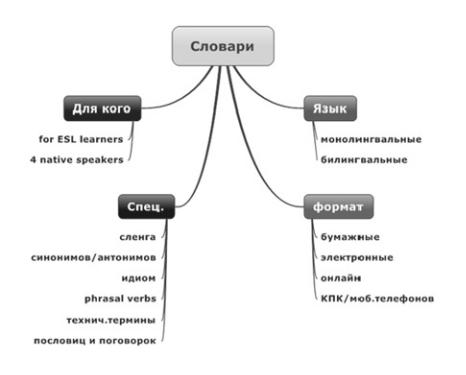
2. Read high literature. Challenge yourself by reading as many books as you have the time and inclination for. Read classics. Read new fiction and read old fiction. Read poetry. Read Herman Melville, William Faulkner, and Virginia Woolf.
• Try reading nonfiction and technical books: these will rapidly teach you not only new ways to speak, but also new ways to think. Read about a variety of subjects, like philosophy, religion, and science.
• If you usually read the local paper, consider trying the long, difficult stories in national, international and business newspapers and magazines, like The New Yorker or The Economist.
There are many classics available for your perusal at Project Gutenberg (http://gutenberg.org ) and LibriVox ( http://www.librivox.org)
3. Read online sources. Read online magazines, essays, and blogs on a variety of subjects. Read record reviews and fashion blogs.
4. Look up any words you don't recognize. When you see an unfamiliar word, do not skip over it impatiently. Try to puzzle out its possible meaning in the context of the sentence, then look it up in the dictionary and confirm its definition.
• Consider keeping a small notebook with you and quickly jot down unknown words as you come across them for checking later. If you hear or see a word you don't know, be sure to look it up. 5. Read the dictionary. Dive in. Read entries for words you aren't yet familiar with. This requires the ownership of a quality dictionary to make it more interesting, so look for a dictionary that has lengthy explanations on the origins and uses of words, as these will go a long way to helping you remember the word and enjoy using your dictionary.
Using a dictionary.
“Dictionaries are like watches, the worst is better than none and the best cannot be expected to go quite true”. Samuel Johnson.
6
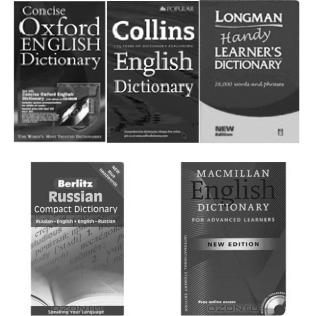
1 Answer the questions:
Which dictionaries do you use?
Study the mind map ( From http://elf-english.ru) and the table below. Learn about types of dictionaries
Печатные |
|
бумажные словари |
|
|
|
Электронные слова- |
ABBYY Lingvo |
ри |
http://www.lingvo.ru/ |
Онлайн-словари |
http://www.multitran.ru |
|
http://www.lingvo-online.ru |
|
http://www.merriam-webster.com |
|
http://dictionary.cambridge.org |
|
http://www.ldoceonline.com/ |
|
http://www.oxforddictionaries.com/ |
|
http://www.macmillandictionary.com/ |
|
http://www.wordreference.com/ |
|
http://www.yourdictionary.com/ |
|
|
Приложения для |
https://play.google.com/store/apps/details?id=com.kreatorz.englishidioms. |
iphone, Ipad |
free&hl=ru |
7
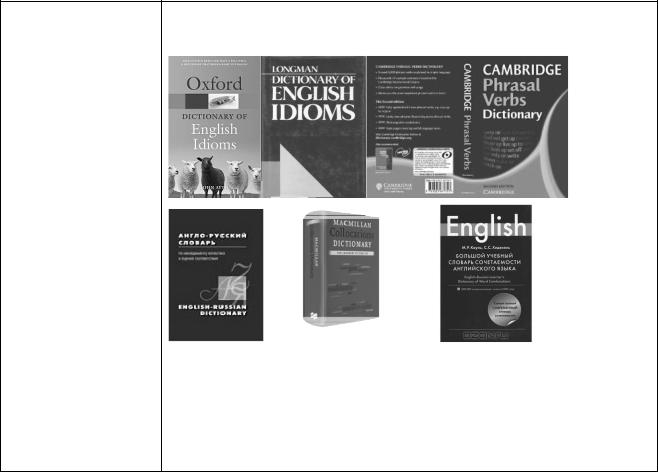
Специальные словаСловари английского сленга http://onlineslangdictionary.com
ри Словари идиом http://idioms.thefreedictionary.com, http://itools.com/tool/cambridge-international-dictionary-of-idioms
Словари фразовых глаголов Словари сочетаемости
Словари технических и профессиональных терминов Иллюстрированные словари http://visual.merriam-webster.com, http://www.infovisual.info/, http://www.visuwords.com/
2. Using a bilingual dictionary (from New Headway English Course by John and Liz Soars, OUP)
a) What are these words? Write noun, verb, adjective, adverb, preposition or past tense.
bread __________ |
beautiful__________ |
on ____________ |
hot ____________ |
in _______________ |
came__________ |
write ___________ |
never ____________ |
eat____________ |
quickly _________ |
went _____________ |
letter__________ |
b) These word have more than one meaning. Write two sentences that show different meanings. Use a dictionary.
|
Sentence 1 |
Sentence 2 |
book |
I’m reading a good book. |
I booked a room at a hotel. |
kind |
|
|
can |
|
|
mean |
|
|
flat |
|
|
play |
|
|
train |
|
|
ring |
|
|
8
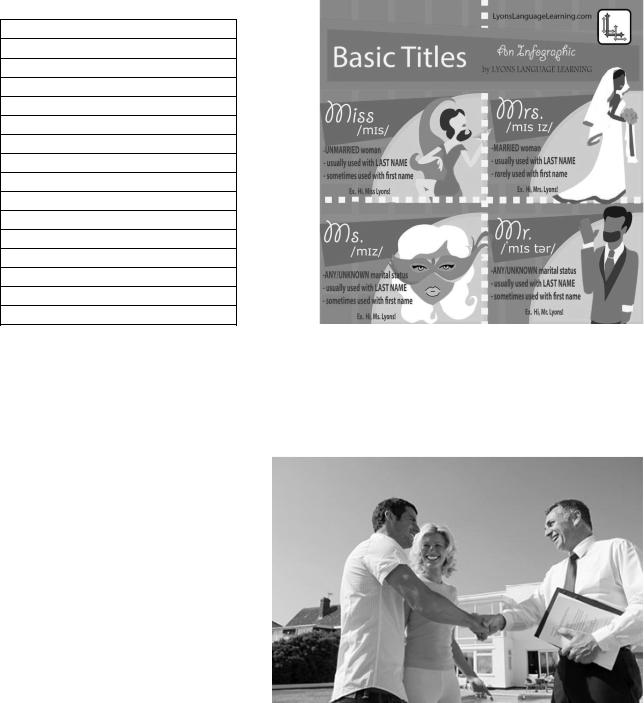
Communicating in English. Introducing yourself. Meeting people 1. Study basic titles, useful phrases and
expressions below Informal
Hello, I’m Hi/hey Everyone call me People call me
My friends call me I’m…. But call me You can call me
Less formal
Hello, my name is …. Please, call me…
Formal
Please, let me introduce myself May I introduce myself? Allow me to introduce myself Excuse me, my name is …
2. Go to http://www.youtube.com/watch?v=h-VKSSd9hko
Watch the video from the website http://twominenglish.com/ “How to introduce yourself in English” . Write out some other phrases that are used while introducing yourself. Add them to the table.
Reading
1. Read the text to find out what factors determine the use of greetings and introductions.
The language of greetings in English depends mainly on the situation the speakers are in and the relationship they have with the people they're talking to. In official situations (business meetings, official receptions, and conferences) such greetings as “Good morning!”, “Good afternoon!”, and “Good evening!” are used. But people who know each other generally say: Hello! (Hul'lo!) .
After the greetings, British people usually say: 'How 'are you?. The answer usually is: ,Fine, 'thank you! And 'how are 'you?. Another possibility is 'Not too , bad I'm 'glad to ,say. When greeting close friends, 'Hi! is quite possible. In fact, "Hi!" is an abbreviation of "hiya" which in turn is a corruption of "How are you?". While common enough as a casual, informal greeting, especially among young people, "Hi" would certainly not be considered correct use in any formal situation. It is better to say "Hello!". As is known, "Hello!" is comparatively recent in its general use, dating back to the invention of the telephone. They say Edison, always impatient with the waste of time or energy, settled on "Hello!".
Remember: the British don't often shake hands when greeting each other. As a matter of fact, they normally shake hands with people when they meet them for the first time or if they
9
